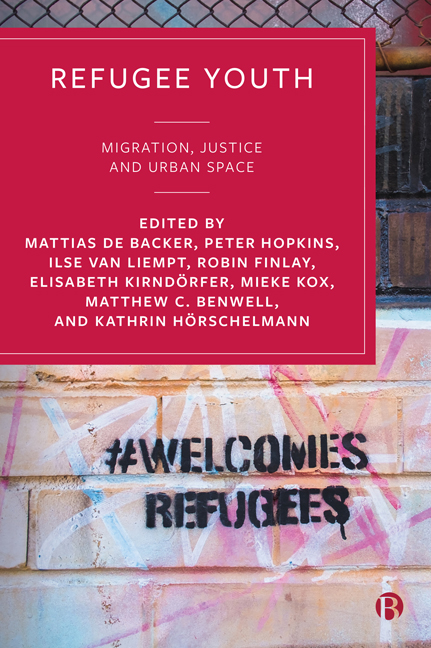Book contents
- Frontmatter
- Contents
- List of Figures and Tables
- Notes on Contributors
- Acknowledgements
- 1 Introducing Refugee Youth: Migration, Justice and Urban Space
- 2 Storying Belonging, Enacting Citizenship? (Dis)articulations of Belonging in a Community Theatre Project with Young Refugees and Asylum Seekers in Leipzig, Germany
- 3 Jackets and Jewellery: Racialised Dispossession and Struggles over Public Space in Denmark
- 4 Venezuelan Refugee Youth and Brazilian Schooling: The Individual between Languages and Spaces
- 5 The Inclusionary Potential and Spatial Boundaries of (Semi-)Public Space: Refugee Youth’s Everyday Experiences in the Urban Fabric of Amsterdam
- 6 Navigating ‘Purdah’ Culture in Urban Space: The Restricted Lives of Young Married Rohingya Refugees in Malaysia
- 7 Inclusive Urban Planning and Public Space for Refugee Youth in Pursuit of a Just City in Amman, Jordan
- 8 Sense of Belonging among Tibetan Refugees in India: A Case Study of the Bylakuppe Settlement in Karnataka, India
- 9 Negotiating Identity in Urban Space: Everyday Geographies of Syrian Students in Istanbul
- 10 ‘You’re Judged a Lot’: Australian Sudanese and South Sudanese Youths’ Perspectives on Their Experiences in Public Spaces
- 11 Hair Salons as ‘Private-Public Spaces’: Exploring the Experiences of Young Migrant Women in an Urban Township in South Africa
- 12 Emotion and Spatial Belonging: Exploring Young Migrant Men’s Emotional Geographies in Cork, Ireland
- 13 Homemaking through Music in Urban Africa: Creating Opportunities as a Refugee and a Migrant in Kinshasa and Dar es Salaam
- 14 Planetary Listening
- 15 Refugee Youth: Politics, Publicness and Visibility
- Index
9 - Negotiating Identity in Urban Space: Everyday Geographies of Syrian Students in Istanbul
Published online by Cambridge University Press: 18 January 2024
- Frontmatter
- Contents
- List of Figures and Tables
- Notes on Contributors
- Acknowledgements
- 1 Introducing Refugee Youth: Migration, Justice and Urban Space
- 2 Storying Belonging, Enacting Citizenship? (Dis)articulations of Belonging in a Community Theatre Project with Young Refugees and Asylum Seekers in Leipzig, Germany
- 3 Jackets and Jewellery: Racialised Dispossession and Struggles over Public Space in Denmark
- 4 Venezuelan Refugee Youth and Brazilian Schooling: The Individual between Languages and Spaces
- 5 The Inclusionary Potential and Spatial Boundaries of (Semi-)Public Space: Refugee Youth’s Everyday Experiences in the Urban Fabric of Amsterdam
- 6 Navigating ‘Purdah’ Culture in Urban Space: The Restricted Lives of Young Married Rohingya Refugees in Malaysia
- 7 Inclusive Urban Planning and Public Space for Refugee Youth in Pursuit of a Just City in Amman, Jordan
- 8 Sense of Belonging among Tibetan Refugees in India: A Case Study of the Bylakuppe Settlement in Karnataka, India
- 9 Negotiating Identity in Urban Space: Everyday Geographies of Syrian Students in Istanbul
- 10 ‘You’re Judged a Lot’: Australian Sudanese and South Sudanese Youths’ Perspectives on Their Experiences in Public Spaces
- 11 Hair Salons as ‘Private-Public Spaces’: Exploring the Experiences of Young Migrant Women in an Urban Township in South Africa
- 12 Emotion and Spatial Belonging: Exploring Young Migrant Men’s Emotional Geographies in Cork, Ireland
- 13 Homemaking through Music in Urban Africa: Creating Opportunities as a Refugee and a Migrant in Kinshasa and Dar es Salaam
- 14 Planetary Listening
- 15 Refugee Youth: Politics, Publicness and Visibility
- Index
Summary
Introduction
More than three million Syrian migrants are now living in Turkey, escaping from the harsh conditions of war in their country (Erdoğan, 2018). Many of the migrants are young people, and spatial experiences of young migrants are often different from adult experiences (Evans, 2008, p 1659). A particularly important youth group are Syrian students, who are the subject focus in this chapter. Syrian students have a visible presence in the social life of Istanbul and negotiate various forms of exclusion/inclusion in everyday geographies of the city. Therefore, in this chapter, I focus on the everyday spaces of Syrian students and examine the encounters and identity negotiations that occur in those spaces. My principal question is, ‘How do Syrian students construct and negotiate identities in their everyday geographies, and how does this impact on their sense of place in Istanbul?’
In this research, the urban spatial experiences of young refugees have a central position. And urban space is conceptualised as a ‘negotiated reality’ (Anderson, 1991, p 28). Since places are the essential creator of difference, people experience othering and difference in shared places of cities. Elias and Scotson (1994) in their study use the concepts of ‘established’ and ‘newcomers’ to articulate the logic behind the power relations constructed between residents (insiders) and newcomers (outsiders/migrants). Through stigmatising the zones of newcomers and attributing bad behaviours to them, native people exclude them from society. However, migrants also negotiate space. As a result, encountering is not fixed but open to surprise (Ahmed, 2009) and unpredictable. And it can have transformative capacity (Wilson, 2017).
I use ‘encounter’ here to mean a meeting between those with different identities (ethnicity, nationality, gender, for example) and suggest that encounters can transform the meaning and making of urban space (Wilson, 2017). Among the various populations negotiating their identities through encounters, youth identities are especially dynamic, as they are often highly adaptable to changes in the urban environment (Dwyer, 1998). I use ‘space’ and ‘place’ interchangeably as the combination of material, metaphorical, real and imagined spaces controlled, perceived, practised and created by young Syrians. Considering the dynamic and social construction of space, Massey focuses on encounters in terms of experiences, memories and associations within space.
- Type
- Chapter
- Information
- Refugee YouthMigration, Justice and Urban Space, pp. 139 - 152Publisher: Bristol University PressPrint publication year: 2023
- 1
- Cited by



